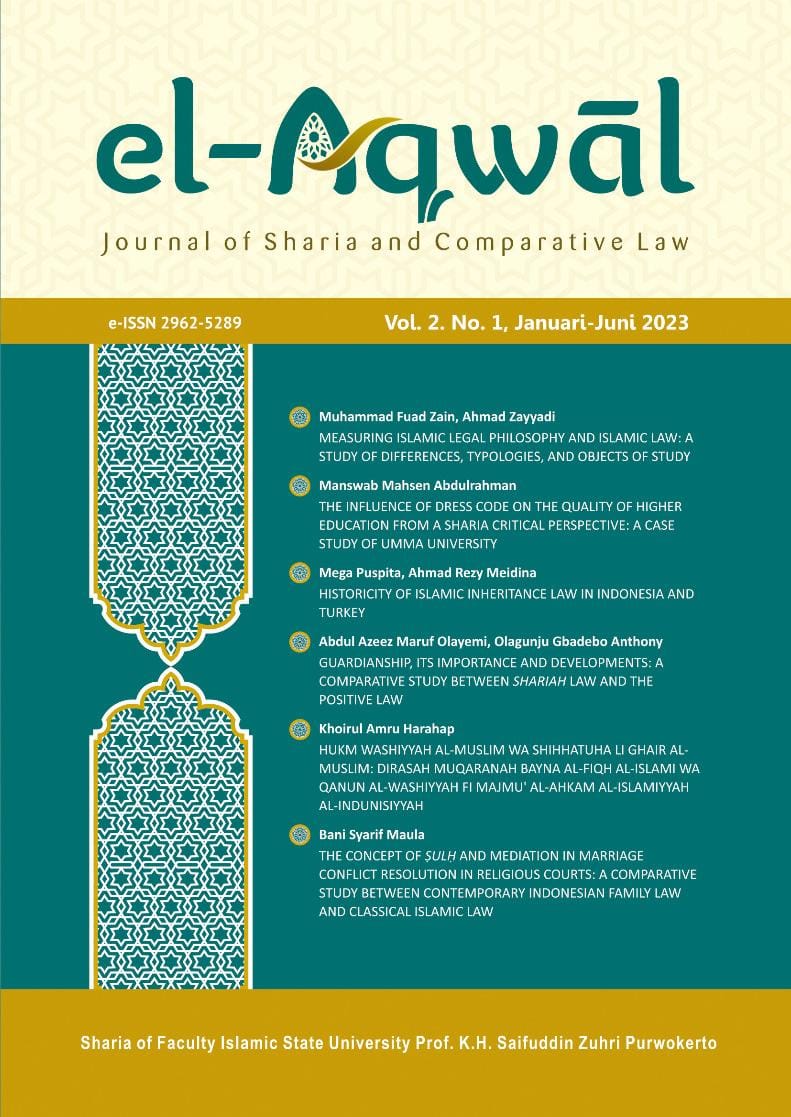Measuring Islamic Legal Philosophy and Islamic Law: a Study of differences, typologies, and objects of study
DOI:
https://doi.org/10.24090/el-aqwal.v2i1.7472Keywords:
Islamic Legal Philosophy, Islamic Law, Legal Maxims, Maqāsid al-SyarīʻahAbstract
This paper explores the philosophy of Islamic law and Islamic law in terms of definition, object, and implementation. The two cannot be separated in the discourse of Islamic law. By understanding the two terms, will be wise in giving the law to a problem that arose both in classical times and now. Philosophy of Islamic Law with a philosophical approach uncovers fundamental issues conceptually, methodically, systematically, radically, universally, comprehensively, and rationally. Meanwhile, the law, within the framework of Islamic norms, is formal legislation and from customs recognized by the ummah. The objects and methods of Islamic legal philosophy are to achieve benefit and the ultimate goal of Maqāsid al-Syarīʻah and are analytical, epistemological, critical, rational, and comprehensive.Downloads
References
Abdullah, M Amin. “ Mazhab” Jogja: Menggagas Paradigma Ushul Fiqh Kontemporer. Vol. 1. Ar-Ruzz Press, 2002.
al-Alwani, Taha Jabir. Metodologi Hukum Islam Kontemporer. Edited by Yusdani. Yogyakarta: UII Press, 1994.
Auda, Jasser. Maqasid Al-Shari’ah as Philosophy of Islamic Law. International Institute of Islamic Thought (IIIT), 2022.
Baderin, Mashood A. “A Comparative Analysis of the Right to a Fair Trial and Due Process under International Human Rights Law and Saudi Arabian Domestic Law.” The International Journal of Human Rights 10, no. 3 (2006): 241–84.
Dahlan, Moh, and Abdullahi Ahmed An-Na’im. Epistemologi Hukum Islam. Yogyakarta: Pustaka Pelajar, 2009.
Djamil, Fathurrahman. Filsafat Hukum Islam. Jakarta: Logos Wacana Ilmu, 1997.
Firdaus, Firdaus, Ahmad Juneidi, Lola Astari, and Firda Mustika Sari. “Various Methods of Establishing Contemporary Islamic Law.” Ulumuddin: Jurnal Ilmu-Ilmu Keislaman 10, no. 1 (2020): 39–58.
Hariyanto, Hariyanto. “Tradition of Besan Bali Marriage in the Muslim Community of Banjarnegara.” IBDA: Jurnal Kajian Islam Dan Budaya 20, no. 1 (2022): 59–72.
Iqbal, Khurshid. “Re-Conceptualising the Right to Development in Islamic Law.” The International Journal of Human Rights 14, no. 7 (December 1, 2010): 1013–41. https://doi.org/10.1080/13642980902933597.
Kattsoff, Louis O. Pengantar Filsafat. Yogyakarta: Tiara Wacana, 2004.
Mas’ udi, Masdar Farid. Islam & Hak-Hak Reproduksi Perempuan: Dialog Fiqih Pemberdayaan. Bandung: Mizan, 1997.
Mu’allim dan Yusdani, Amir. Konfigurasi Pemikiran Hukum Islam. Yogyakarta: UII Press, 1999.
Nasotion, Hasyimsyah. Filsafat Islam. Jakarta: Gaya Media Pratama, 2005.
Rizal, Mustansyir, and Misnal Munir. Filsafat Ilmu. Yogyakarta: Pustaka Pelajar, 2006.
Sanaky, Hujair A H. “Gagasan Khaled Abou El Fadl Tentang Problem Otoritarianisme Tafsir Agama Pendekatan Hermeneutik Dalam Studi Fatwa-Fatwa Keagamaan.” Al-Mawarid Journal of Islamic Law, no. 14 (2005): 26038.
Syarifuddin, Amir. Pengertian Dan Sumber Hukum Islam. Jakarta: Bumi Akasara, 1992.
Syaukani, Imam. “Rekonstruksi Epistimologi Hukum Islam Indonesia Dan Relevansinya Bagi Pengembangan Hukum Nasional.” Rajawali Pers, 2006.
Wahyudi, Yudian. Maqashid Syariʼah Dalam Pergumulan Politik: Berfilsafat Hukum Islam Dari Harvard Ke Sunan Kalijaga. Yogyakarta: Pesantren Nawesea Press, 2007.
Watt, William Montgomery. Muhammad: Prophet and Statesman. London: Oxford University Press, 1969.
Downloads
Published
How to Cite
Issue
Section
License
Authors who publish with this journal agree to the following terms: Authors retain copyright and grant the journal right of first publication with the work simultaneously licensed under a Creative Commons Attribution-ShareAlike 4.0 International License that allows others to share the work with an acknowledgment of the work's authorship and initial publication in this journal.





